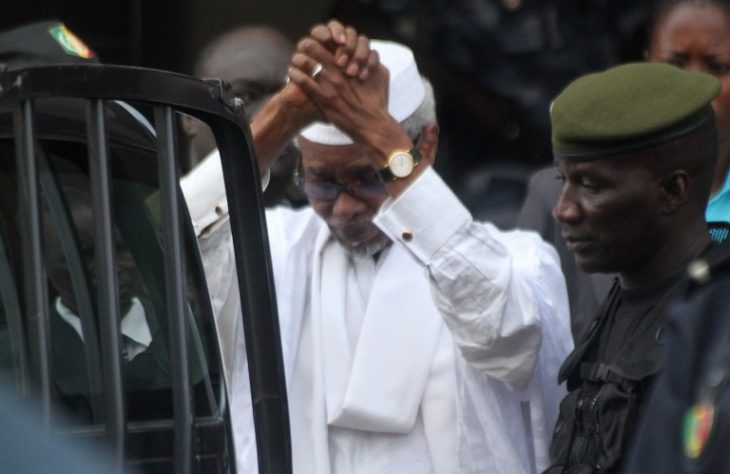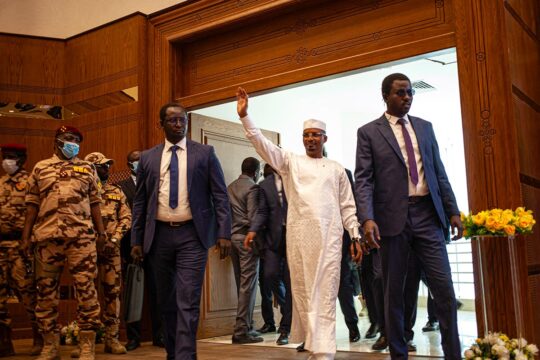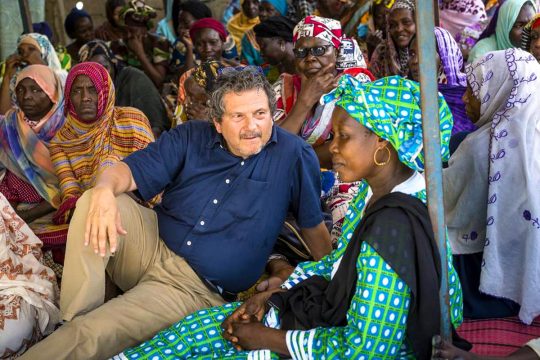A special court in Senegal (the Extraordinary African Chambers, EAC) has announced it plans to start the trial of former Chadian president Hissène Habré on July 20 this year. This will be the first time a former African dictator goes on trial for serious crimes before an African jurisdiction based in another African country.
“The judgment that will be handed down will be scrutinized by everyone and will set a precedent,” said Senegalese Justice Minister Sidiki Kaba at the swearing-in of EAC judges in April.
Habré is accused of war crimes, crimes against humanity and torture.
Gberdao Gustave Kam of Burkina Faso, who is a former judge of the International Criminal Tribunal for Rwanda (ICTR), is president of the court that will conduct this long-awaited trial. Amady Diouf and Moustapha Ba of Senegal have also been appointed as judges, and Pape Ousmane Diallo (also Senegalese), as a substitute judge.
According to the Statute of the EAC, the court that will try Habré is composed of an international presiding judge and two Senegalese judges, with two Senegalese substitute judges. They are all appointed by the African Union Commission Chairperson, after being nominated by the Senegalese Justice Minister.
Belgian complaint against Senegal
The upcoming trial will be the culmination of a fifteen-year saga. Habré has been living in Dakar since 1990, when he was chased from power by current Chadian president Idriss Deby. He was indicted the first time in Senegal in 2000, but the country’s courts said they did not have the jurisdiction to try him. Victims then turned to Belgium, which said it had jurisdiction because some of the victims had Belgian nationality. In September 2005, after four years of investigations, a Belgian judge indicted Habré, and Brussels requested his extradition. After Dakar refused the request and three years of fruitless negotiations with regard to an African Union request, Belgium took Senegal to the International Court of Justice (ICJ). On July 20, 2012, the ICJ ordered Senegal to either prosecute Habré “without delay” or extradite him.
The case moved forward after the election of a new Senegalese President, Macky Sall. In February 2013, Dakar inaugurated the Extraordinary African Chambers, special courts within the Senegalese justice system, under an agreement with the African Union. These courts have a mandate to try those most responsible for serious crimes committed under Habré’s regime (1982 to 1990).
The former dictator was arrested at his home in Dakar on June 30, 2013. Two days later he was indicted for crimes against humanity, war crimes and torture. “This is a first victory for the victims,” said Jacqueline Moudeina, victims’ lawyer and president of the Chadian Association for the Promotion and Defence of Human Rights (ATPDH). The reaction was similar from Human Rights Watch lawyer Reed Brody, who has been following the case since 1999. He said it was the “beginning of the end” of the interminable political and legal wrangling to which the victims had been subject.
Political Police
Hissène Habré, who is presented on his official website as the “liberator, saviour and builder of the Republic of Chad”, is accused of thousands of political assassinations and systematic use of torture when he was in power.
Documents from the Directorate of Documentation and Security (DDS), Habré’s political police, obtained by Human Rights Watch in 2001, revealed the names of 1,208 people who were executed or died in detention, and 12,231 victims of various human rights abuses. In a 2013 report, HRW said atrocities committed under Habré were systematic. “Habré wasn’t a distant ruler who was unaware of the massive atrocities carried out in his name,” said HRW’s Olivier Bercault, the main author of the study. “We found that Habré directed and controlled the political police, who tortured and killed those who opposed him or those who simply belonged to the wrong ethnic group.” The 714-page study is entitled La Plaine des Morts (The Plain of the Dead).
After Habré’s indictment, the EAC investigating judges got straight to work. They conducted four rogatory commissions in Chad during which they heard victims and witnesses, consulted DDS archives and visited alleged sites of mass graves. However, a fifth rogatory commission planned for the end of October-early November 2014 could not take place because of opposition from the Chadian authorities, who thus took revenge after their request to be recognized as civil party in the Habré case was rejected. The EAC wanted to return to N'Djamena to proceed with the indictment and questioning of Saleh Younous and Mahamat Djibrine (“El Jonto”), two suspected former leaders of the DDS who were recently tried in Chad with some 20 others. On March 25, a criminal court in N'Djamena convicted most of them for murder and torture.
“A judicial farce”
All this investigation work took place without the participation of Habré’s lawyers, who contest the legality and impartiality of the EAC. In addition, the investigating judges have not managed to get any words out of Habré, who is exercising his right to remain silent. “We will not take part in the work of these Chambers because we do not consider them to be either independent or impartial,” François Serres, one of the lawyers, told Hirondelle in December 2013. “The investigation is totally biased towards the prosecutor, who wants to protect President Deby. It’s a real judicial farce. We cannot participate.”
Even before Habré was arrested, his lawyers filed a request to the Court of Justice of the Economic Community of West African States (ECOWAS) asking it to halt all criminal procedures against their client. The Court said on November 5, 2013 that it did not have jurisdiction to rule on the application. Victims’ lawyers said Habré had failed in yet another attempt to delay justice, and hailed the work of the EAC. After this setback, Habré’s lawyers went to the Senegalese Supreme Court contesting the constitutionality of the EAC. They argued that the Senegalese Justice Minister at the time, Aminata Touré, did not have the power to sign on behalf of the Senegalese government the treaty with the AU setting up the Extraordinary African Chambers. However, the Senegalese Supreme Court threw out this argument at the beginning of March. It ruled that as Justice Minister, she did have the power to sign. It also noted that the creation of the EAC has been ratified by Senegal’s parliament.
One of the question marks still hanging over the trial is how it will be broadcast. According to the EAC Statute, is to be filmed, recorded and broadcast. However, President Deby has said he does not want it broadcast live in Chad, but rather extracts on state media, as was the case for the recent DDS trial.






